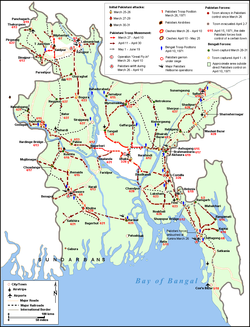The Pakistani prisoners of war during the Indo-Pakistani war of 1971 were the servicemen deployed in the Eastern Command of the Pakistan armed forces who were held in by the Indian Army.[1]
Pakistan's Yahya administration conveyed their intentions to retreat from their eastern wing to the United Nations on 10 December 1971,[2] and a formal surrender was submitted and accepted when the Commander of Eastern Command and Governor of East Pakistan, Lieutenant-General A.A.K. Niazi, signed an instrument of surrender with his counterpart, Lieutenant General Jagjit Singh Aurora, GOC-in-C of Eastern Command, on 16 December 1971.: 136 [3]
The surrender ultimately culminated in the conclusion of liberation efforts in East as India accepts the unilateral ceasefire to end its war efforts in the western theatre on 17 December 1971.: 136 [3] The surrender was the largest surrender since the end of World War II,: 17 [4][5][6] with Indian Army taking approximately 93,000–95,000 Pakistani service personnel as war prisoners in East.: 513 [7][8][6]

Due to the concern of their safety and wellbeing, the war prisoners were transported via train and air, where they were held in the war camps by the Indian Army in different parts of India.[9] The issue of transfer and transportation of war prisoners to India was very controversial between the India and Bangladesh since the Provisional Government of Bangladesh had shown strong resistance and opposition of such act to India as they wanted to bring charges on the war prisoners on the crimes against humanity in their special courts established in Dhaka.[1]
The overwhelming majority of war prisoners were officers, most of them were in the Army and Navy, while relatively small number of Air Force and Marines; others in larger number had served in paramilitary forces.[1] India treated the war prisoners in accordance to the Geneva Convention, ruled 1925, but used this issue as a tool to coerce Pakistan into recognizing the sovereignty of Bangladesh after three countries reached compromised in 1974.: 78 [10][2] The issue of war prisoners contributed in quick recognition of Bangladesh but it also had effects on India securing its eastern front from Pakistan-controlled hostile state, East-Pakistan, to India supported Bangladesh.: 314 [11]
According to Pakistani observers and commentators, India, by taking and managing the ~97,000 war prisoners in Indian Army-ran camps, had gained itself a bargaining chip to remove its security threat faced by its eastern front by recognizing the sovereignty of the country, Bangladesh, they had intervened to help.[12] However, according to Indian author, M. Ragostra, the war prisoners were actually more of liability than leverage since it became India's responsibility to protect and feed the prisoners that were in great numbers.[9]
- ^ a b c Cloughley, Brian (2016). A History of the Pakistan Army: Wars and Insurrections. Skyhorse Publishing, Inc. ISBN 9781631440397. Retrieved 8 August 2017.
- ^ a b "The Separation of East Pakistan | Great setback to Pakistan in year 1970". Story of Pakistan. Islamabad: Nazaria-i-Pakistan Trust. 1 June 2003. Retrieved 8 August 2017.
- ^ a b Sabharwal, Gopa (2007). "Indian forces liberate Bangladesh". India Since 1947: The Independent Years. Penguin Books India. ISBN 9780143102748. Retrieved 8 August 2017.
- ^ Aoyagi, Akiko; Shurtleff, William (24 April 2017). History of U.S. Federal and State Governments' Work with Soybeans (1862-2017): Extensively Annotated Bibliography and Sourcebook. Soyinfo Center. p. 2595. ISBN 978-1-928914-91-4.
- ^ Koul, Bill K. (2020). The Exiled Pandits of Kashmir: Will They Ever Return Home?. Springer Nature. p. 254. ISBN 978-981-15-6537-3.
- ^ a b "India Pakistan | Timeline". BBC News. 6 December 1971. Retrieved 27 November 2015.
- ^ Shurtleff, William; Aoyagi, Akiko (2010). History of Soybeans and Soyfoods in South Asia / Indian Subcontinent (1656-2010): Extensively Annotated Bibliography and Sourcebook. Soyinfo Center. ISBN 9781928914310. Retrieved 8 August 2017.
- ^ Singh, Air Commodore Jasjit (2013). "Role of Indian Air Force in 1971 War". KW Publishers Pvt Ltd. ISBN 9789385714825. Retrieved 8 August 2017.
- ^ a b Rasgotra, Maharajakrishna (2016). A Life in Diplomacy. Penguin UK. ISBN 9789385890956. Retrieved 8 August 2017.
- ^ Dash, Satya Prakash (2004). Constitutional and Political Dynamics of India. Sarup & Sons. ISBN 9788176255325. Retrieved 8 August 2017.
- ^ Jayapalan, N. (2001). Foreign Policy of India. Atlantic Publishers & Dist. ISBN 9788171568987. Retrieved 8 August 2017.
- ^ Herrick, Christopher; Gai, Zheya; Subramaniam, Surain (2016). China's Peaceful Rise: Perceptions, Policy and Misperceptions. Oxford University Press. ISBN 9781526104809. Retrieved 8 August 2017.